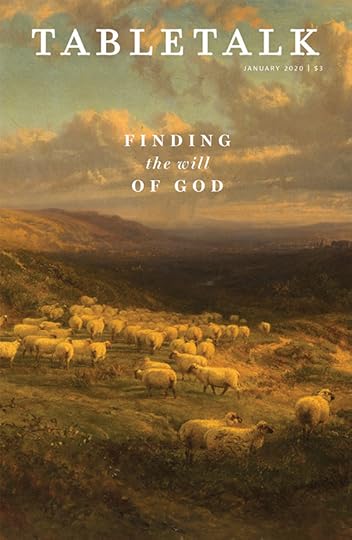R.C. Sproul's Blog, page 101
January 3, 2020
How Do Scholars Estimate When Each Book of the Bible Was Written?

Can we really know when the books of the Bible were written? From one of our live events, R.C. Sproul and Derek Thomas consider the evidence that has led even some liberal scholars to embrace early dates for the New Testament.
Message us for clear, concise, and trustworthy answers to your biblical and theological questions at Ask.Ligonier.org.
Read the Transcript


Ask Ligonier with Sinclair Ferguson: Live Wednesday at 7:30 p.m. ET

On Wednesday, January 8, at 7:30 p.m. ET, Dr. Sinclair Ferguson will join us as a special guest on our Ask Ligonier team to answer your biblical and theological questions live online.
Dr. Ferguson is a Ligonier Ministries teaching fellow and Chancellor’s Professor of Systematic Theology at Reformed Theological Seminary. He previously served as senior minister of the First Presbyterian Church in Columbia, S.C., and he has written numerous books, including The Whole Christ, Devoted to God, and In the Year of Our Lord.
Simply tweet us your questions by using the hashtag #AskLigonier or leave them as comments or messages on our Facebook page. This special online event will be streamed live on Ligonier’s blog, YouTube, Facebook, and Twitter. We hope you’ll join us on Wednesday.


5 Ways to Pray for Your Pastor in 2020

As a pastor, I sometimes mistakenly think that those most in need of my prayers in the church are those who have the most noticeable spiritual or physical weaknesses. I would imagine that, if we are honest with ourselves, we have all thought or said at some time or another something along the lines of, “So-and-so is really going to need a lot of prayer.” On the one hand, it is entirely right that we acknowledge that our brothers and sisters who have more noticeable weaknesses have a great need for our prayers. On the other hand, however, those to whom God has given the most gifts and graces are also greatly in need of our prayers. Contrary to what some might suppose, ministers of the gospel desperately need the prayers of the saints.
Pastors need the saints’ prayers because they are ever the object of the flaming arrows of the evil one. In addition, the world is eager to run them over at any opportunity. As one of my seminary professors so illustratively put it, “Ministers have a bull’s eye on their backs and footprints up their chests.” Sadly, this is even a reality for pastors within the context of the local church.
With so much opposition and difficulty within and without, pastors constantly need the people of God to be praying for them. The shepherd needs the prayers of the sheep as much as they need his prayers. He also is one of Christ’s sheep and is susceptible to the same weaknesses. While there are many things one could pray for pastors, here are five straightforward scriptural categories:
1. Pray for their spiritual protection from the world, the flesh, and the devil.
Whether it was Moses’ sinful anger leading to his striking of the rock (Num. 20:7-12), David’s adultery and murder (2 Sam. 11), or Simon Peter’s denial of the Lord (Matt. 26:69-75) and practical denial of justification by faith alone (Gal. 2:11-21), ministers are faced with the reality of the weakness of the flesh, the assaults of the world, and the rage of the devil. There have been a plethora of ministers who have fallen into sinful practices in the history of the church and so brought disgrace to the name of Christ. Since Satan has ministers of the gospel (and their families) locked in his sight—and since God’s honor is at stake in a heightened sense with any public ministry of the word—members of the church should pray that their pastor and their pastor’s family would not fall prey to the world, the flesh, or the devil.
2. Pray for their deliverance from the physical attacks of the world and the devil.
While under prison guard in Rome, the Apostle Paul encouraged the believers in Philippi to pray for his release when he wrote, “I know that this will turn out for my deliverance through your prayer and the supply of the Spirit of Jesus Christ” (Phil. 1:19; see also 2 Cor. 1:9-11.). After Herod imprisoned Simon Peter, we learn that “constant prayer was offered to God for him by the church” (Acts 12:5). After an exodus-like deliverance from prison, Luke tells us that Peter showed up at the home where the disciples were continuing to pray for his deliverance. This is yet another example of the minister being delivered from harm due, in part, to the prayers of the saints.
3. Pray for doors to be opened to them for the spread of the gospel.
In his letter to the Colossians, Paul asked the church to be praying “that God would open to us a door for the word, to speak the mystery of Christ, for which I am also in chains” (Col. 4:3). The success of the spread of the gospel is dependent in part on the prayers of the people of God. In this way, the church shares in the gospel ministry with the pastor. Though he is not the only one in the body who is called to spread the word, he has a unique calling to “do the work of an evangelist.” The saints help him fulfill this work by praying that the Lord would open doors “for the word, to speak the mystery of Christ.”
4. Pray that they might have boldness and power to preach the gospel.
In addition to praying for open doors for the ministry of the word, the people of God should pray that ministers would have Spirit-wrought boldness. When writing to the church in Ephesus, the Apostle Paul asked them to pray for him “that utterance may be given to me, that I may open my mouth boldly to make known the mystery of the gospel” (Eph. 6:19). There is a well-known story of several college students going to visit the Metropolitan Tabernacle in London in order to hear Charles Spurgeon preach. As the story goes, Spurgeon met them at the door and offered to show them around. At one point he asked if they wanted to see the church’s heater plant (boiler room). He took them downstairs where they saw hundreds of people praying for God’s blessings on the service and on Spurgeon’s preaching. The gathering of the people of God to pray for the ministry of the word is what he called “the heating plant”! Believers can help ministers by praying that they would be given boldness and power in preaching the gospel.
5. Pray that they might have a spirit of wisdom and understanding.
One of the most pressing needs for a minister of the gospel is that he would be given the necessary wisdom to counsel, to know when to confront, to mediate, and to discern the particular pastoral needs of a congregation. This is an all-encompassing and recurring need. The minister is daily faced with particular challenges for which he desperately needs the wisdom of Christ. It is said of Jesus that “the Spirit of wisdom and knowledge, and of counsel and might” was upon Him (Is. 11:2). The servants of Christ need that same Spirit. Much harm is done to the church as a whole if the minister does not proceed with the wisdom commensurate to the challenges with which he is faced. Those who benefit from this wisdom can help the minister by calling down this divine blessing from heaven upon him.


January 2, 2020
$5 Friday: Justification, Faith, & Spiritual Growth

It’s time for our weekly $5 Friday sale. This week’s resources include such topics as justification, faith, spiritual growth, the Psalms, the Westminster Confession of Faith, Jonathan Edwards, and more.
Sale runs through 12:01 a.m. — 11:59 p.m. Friday ET.
View today’s $5 Friday sale items.


Save 55% on Tabletalk and Get a Free Bible

Tabletalk magazine is a monthly discipleship magazine written by some of today’s leading theologians and pastors to help Christians grow in the knowledge of God. Each issue’s daily Bible studies give structure to your Scripture reading, accompanied by articles from trusted teachers on a variety of topics related to theology and the Christian life.
When you subscribe today for three years, we’ll also send you a free ESV Thinline Bible. Light, portable, and less than 1” thick, this Bible can be packed with your current issue of Tabletalk and brought anywhere. You’ll also receive a high-quality slipcase to store each issue of Tabletalk for the next three years. Three years of theologically rich and practical Bible study can be yours for only $49.
SIGN UP NOW AND GET:
A special 55% discount
A high-quality Tabletalk slipcase
ESV Thinline Bible, coffee leather-like
Digital access to current and past issues
Daily Bible studies
Monthly articles from trusted theologians
An effective one-year Bible-reading plan
Exclusive resource offers
SUBSCRIBE NOW
U.S. & Canada only. Please allow 4-8 weeks for delivery.


Columns from Tabletalk Magazine, January 2020
The January issue of Tabletalk considers the will of God, focusing particularly on our calling and vocation. Calling is a broad word, and one question that Christians sometimes ask is, “What am I called to do?” In most cases, they are looking to identify the vocation that the Lord has for them. This is an important question indeed, but there is much mistaken teaching on this topic that offers little practical guidance, directs people to look in the wrong places for God’s will, or makes people feel like failures when they never seem to find God’s will for their lives. This issue of Tabletalk seeks to help Christians understand what Scripture has to say about God’s calling on our lives, how we can discern it, and how we can honor Him.
For a limited time, the new TabletalkMagazine.com allows everyone to browse and read the growing library of back issues, including this month's issue. You can also purchase the issue or subscribe to get the print issue every month.
Knowing God's Will by Burk Parsons
The Struggle to Find God’s Will by Thomas Brewer
Defining the Will of God by John Tweeddale
Defining the Call of God by Joe Holland
Examples of Callings in Scripture by Scott Redd
Discerning and Stewarding God’s Call for My Life by Fred Greco
Examining Our Motives by Dan Thompson
Leaving a Church Peaceably by J.D. Bridges
Read the Entire Issue
Subscribe to Tabletalk today for only $23 a year, and $20 to renew. You save even more if you get a 2- or 3-year subscription (as little as $1.36 per issue). Get your subscription to Tabletalk today by calling one of Ligonier Ministries’ resource consultants at 800-435-4343 or by subscribing online.


January 1, 2020
His Transcendent Awesome Glory
In this brief clip from his teaching series The Attributes of God, Steven Lawson explains that God's holiness is His transcendent awesome glory.
Transcript
If God were to appear in this room in His holiness, we would all just go unconscious. We wouldn't be able to bear it up. That is why when we go to heaven we have to have a glorified body with glorified eyes to even be able to look upon this holy, awesome, glorified God in heaven—or we burn up like a cinder in His very presence. This is the primary meaning of the holiness of God.
The church has always been strongest when it's had its highest regard for the holiness of God. And those times and epics when it has been weakest have been those times when the church has lost a sense of the vertical holiness of God and want to bring God down to our level, and everything is a horizontal type relationship with God. That is when the church has been the weakest if not even unregenerate. The primary meaning is His transcendent awesome glory.


December 31, 2019
Get a Basic Overview of the Bible

Virtually every Christian at some point has resolved to read the entire Bible. If we believe the Bible is the Word of God, it's natural not to want to miss a word of it. If God delivered a letter to your mailbox, I am sure you would read it. But the Bible is a pretty big letter, and its sheer bulk is somewhat daunting, even to the person with the best of intentions. Therefore, few Christians actually keep a resolution to read through the Bible.
At seminars, I often ask for a show of hands indicating how many people have read the entire Bible. Rarely do even 50 percent of the people answer "yes." I ask, "How many of you have read the book of Genesis?" Almost everyone raises his hand. Then I say, "Keep your hand up if you've also read Exodus." Only a few hands are lowered. "Leviticus?" That's when hands start dropping quickly. With Numbers it's even worse.
Why do many Christians struggle to read the entire Bible?
Reading Genesis is almost like reading a novel. It is mostly narrative history and biography. It tells of important events in the lives of important people such as Noah, Abraham, Jacob, and Joseph. Exodus is likewise gripping, as it tells the poignant story of Israel's enslavement in Egypt and of its liberation under the leadership of Moses. The contest with Pharaoh is exciting. But when we get to Leviticus, everything changes. It's difficult reading about the ceremonies, the sacrifices, and the cleansing rituals because they are foreign to us today. We lack a road map to help us through these difficult portions of the Bible.
Begin with an overview of the Bible
Here's my recommendation: begin with an overview of the Bible. Get the basic framework first. If possible, enroll in a Ligonier Connect course online that will give you such an overview. We have also produced an audio and video series titled Dust to Glory. It gives the basic structure of the Bible from Genesis to Revelation. It does not go into details, but it covers the high points of redemptive history. In addition to this series, I collaborated with Robert Wolgemuth to produce What's in the Bible? The goal of this book is to help the person who has never had a simple introduction to the Bible. In 1977, I published a book titled Knowing Scripture, which is designed to help people master the basic rules of biblical interpretation. I frankly think this book is one of the most important helps that I've ever been able to provide for people in studying the Bible, because it provides basic, foundational principles of biblical interpretation to keep people from falling into errors that would lead to distortions of the teaching of Scripture.
Once you understand the basic framework, you are much better equipped to read the Bible. Here is a pattern I recommend for people who have never read the Bible.
The Old Testament overview:
Genesis (the history of Creation, the fall, and God's covenantal dealings with the patriarchs)
Exodus (the history of Israel's liberation and formation as a nation)
Joshua (the history of the military conquest of the Promised Land)
Judges (Israel's transition from a tribal federation to a monarchy)
1 Samuel (Israel's emerging monarchy under Saul and David)
2 Samuel (David's reign)
1 Kings (Solomon and the divided kingdom)
2 Kings (the fall of Israel)
Ezra (the Israelites' return from exile)
Nehemiah (the restoration of Jerusalem)
Amos and Hosea (examples of minor prophets)
Jeremiah (an example of a major prophet)
Ecclesiastes (Wisdom Literature)
Psalms and Proverbs (Hebrew poetry)
The New Testament overview:
The Gospel of Luke (the life of Jesus)
Acts (the early church)
Ephesians (an introduction to the teaching of Paul)
1 Corinthians (life in the church)
1 Peter (an introduction to Peter)
1 Timothy (an introduction to the Pastoral Epistles)
Hebrews (Christology)
Romans (Paul's theology)
By reading these books, a student can get a basic feel for and understanding of the scope of the Bible without getting bogged down in the more difficult sections. From there, he or she can fill in the gaps to complete the reading of the entire Bible.
We have compiled a thorough list of various Bible reading plans to help you develop a regular habit of reading through the Bible.
This excerpt is taken from Five Things Every Christian Needs to Grow by R.C. Sproul.


Your Partnership in the Gospel Means so Much

We can only reach as many people as God allows through your support. Will you help us in this critical hour?
Ligonier Ministries proclaims, teaches, and defends the truth, and tomorrow begins a new decade of ministry. In the Lord’s providence, your gift today will help us enter 2020 without missing a step.
Year after year, the need that Dr. Sproul set out to address—introducing as many people as possible to the holiness of God—only grows. There is a theological famine around the world. The gospel is obscured and false teaching is everywhere. In many cases, the church is ill-equipped to respond. This is why Ligonier spreads trustworthy discipleship resources now in forty languages, because we believe people everywhere need to know who God is. You and I can help.
Your partnership in the gospel means so much. Will you help Ligonier cross into 2020 in a strong ministry position?
Together, we can help Christians grow strong in God’s Word through broadcasts, publications, plus in-person discipleship training seminars, conferences, and classes to deliver trusted teaching around the world. This outreach is not inexpensive, but it is effective. And it is necessary.
As we approach a new decade of ministry, God has set many new outreach opportunities before us to serve the global church. Trusting Him, our 2020 outreach plan aims for visionary expansion. Millions of our neighbors are starving for trusted Bible teaching. Entire nations and languages lack any access to the rich discipleship resources that we enjoy every day. Now is the time to move forward with fresh courage and resolve in full reliance on the grace of God and His sovereign power.
Your support helps individuals, families, and churches grow in their knowledge of God so that they may serve Him faithfully and live for His glory. Every online gift we receive by 11:30 p.m. ET tonight positions us to reach even more people in the year ahead. Will you help us?
Donate Now
Contributions are tax-deductible as allowed by law. Gifts must be received by 11:30pm ET. December 31, 2019. Thank you for your support.


Weighed in the World’s Scales
Here’s an excerpt from Weighed in the World’s Scales, William Godfrey's contribution to the December issue of Tabletalk:
J.N.D. Kelly has observed that the world often judges the church by the character and conduct of the clergy. In 1 Timothy 3:1–7, Paul gives instructions regarding the essential characteristics required for a man to hold the office of elder. Paul highlights the importance of these qualifications by beginning and ending his list with the same Greek verb meaning “it is necessary” (1 Tim. 3:2, 7). All of the attributes listed in verses 2–7 are absolute essentials for elders.
Paul also begins and ends his list by focusing on reputation. Verse 2 instructs Timothy to look for a man who is “above reproach,” and verse 7 returns to this theme by requiring that an elder candidate be “well thought of by outsiders.” The article will focus on this last qualification given in 1 Timothy 3:7.
Continue reading Weighed in the World’s Scales, or begin receiving Tabletalk magazine by signing up for a free 3-month trial.
For a limited time, the new TabletalkMagazine.com allows everyone to browse and read the growing library of back issues, including this month’s issue.


R.C. Sproul's Blog
- R.C. Sproul's profile
- 1931 followers




